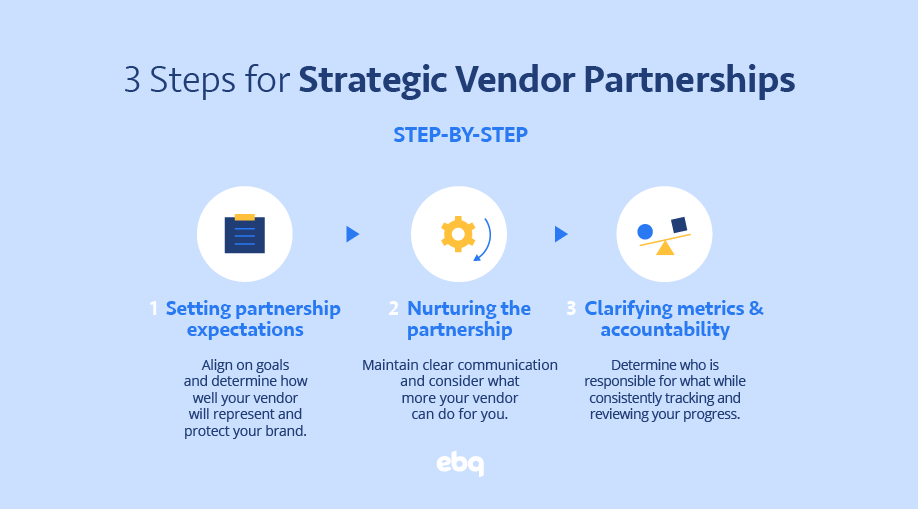Vendor relationships can be integral for a business, but if you’re looking for long-term success, they should serve as a starting point for something better — transforming that vendor into a partner.
These partnerships don’t happen overnight though. Strong partnerships have clear foundations that are nurtured, they emphasize accountability, and they have clearly defined metrics to gauge success.
Focusing on these core priorities can help your business turn your vendor relationships into thriving, mutually beneficial partnerships that create more value for all parties.
Having partnered with thousands of companies, EBQ has experience in identifying the key elements necessary to transition a just-a-vendor into a true partner that acts as an extension of your business.
Below, we’ll discuss the hallmarks of a good partnership that we’ve been able to define over the years.

1. Setting partnership expectations
For any vendor relationship to become a successful partnership, it’s vital that the vendor you choose to partner with already comes with the skills, knowledge, and processes necessary to accomplish your aims, address needs, and facilitate your success.
From there, set aside initial time to collaborate with your prospective partner on a framework of responsibilities and expectations.
If you’re not aligned from the start, it’s unlikely you will sync up when the gears are already in motion, so it’s essential that you establish a foundation with your vendor and ensure both parties understand each other’s needs for an enduring partnership.
Will the vendor be aligned with your goals?
In order for a partnership to be effective, you and your vendor need to ensure your objectives are aligned. In fact, a recent McKinsey study found that managers cited alignment on partnership objectives as the biggest indicator of a partnership’s success or failure.
Your vendor should be prepared to explore multiple ways in which they can provide you with value – not just volume. When alignment is done properly, both the vendor and client can start providing the other with the resources and insights they need to be successful.
When EBQ starts working with a new lead generation client, we ensure goals are aligned with a 90-minute kick-off call where we discuss the client’s universe, including their prospect database, segmentation, and how it will be allocated to our team.
Align with your vendors from the start in a similar fashion so your goals are well-established, and be sure to touch base with your vendor to determine what more they can provide you — a service, a product, a solution — to maintain that alignment and achieve your objectives.
How will they represent & protect your brand?
Since your partner will ideally be acting as an extension of your business, it’s important that this vendor is ramped up and trained on best practices to adequately work on your behalf.
One thing to consider is the individuals who will be working with you and be responsible for your success. Will your organization’s needs be addressed by a team that sees it as a task to be completed, or one that genuinely provides value and has an interest in your continued success?
We recommend a vendor that understands and fully integrates themselves into your business processes. As an example, EBQ uses client scripts, takes time to understand their messaging, and even uses branded email addresses to represent client’s brands as if they were our own.
2. Nurturing the partnership
Once you and your partner have aligned on your goals, it’s important that you both invest the proper time and effort into reinforcing your developing partnership.
Even a partnership that starts off soundly can fall apart from communication and collaboration issues.
This nurturing process should be defined by clear communication between designated parties, your vendor making a concerted effort to understand your business needs, and a proactive thought process of both how they can address these needs and what more they can provide to facilitate even further growth and success on your behalf.
Define point(s) of contact for clear communication
In an ideal client-vendor relationship, your vendor should act as an extension of your business. That all starts with clear communication between effective, reliable members of your respective organizations.
Forgoing the step of establishing clear points of contact to keep both parties informed can create unnecessary confusion and setbacks for the partnership.
To keep your vendor in the loop, it’s essential for your organization to designate a leader or specific team to be responsible for effective partner communication and accountability.
To be effective, have this contact act not only as a conduit between you and your vendor, but be sure they are informed of the vendor’s standard practices and your own.
Having a means of clear communication seems simple, but it is essential to your success. Irregular communication, changes in points of contact, and other factors can create questions and roadblocks in workflow so make sure your chosen vendor has this area firmly nailed down.
Be open to other ways partners can assist
If you aim to make your vendors into partners, it’s wise to choose one that always aims to be mindful of other creative ways they can facilitate your success and add value to your relationship.
Another way to frame this is to think about what gaps lie in the way of your organization’s path to success, and how the services your potential partner provides can be leveraged to overcome these gaps.
Using EBQ and our partners as an example, many of our clients reach out to us needing assistance with outsourced sales and marketing services.
In the case of Sonus, while they initially hired EBQ to follow up on their marketing campaigns, the relationship also grew to include writing and revising scripts, cold calling prospects, and identifying entirely new opportunities for business.
Because EBQ’s specialists are highly experienced in these specific areas, we position ourselves to potential partners as experts who can help them identify gaps in their organization and quickly help to improve them.
3. Clarifying metrics & accountability
Successful vendor partnerships depend on good governance. In fact, in the same McKinsey study, managers cited constructive governance leadership and processes and clearly defined KPIs as core indicators of partnership success, only behind effective communication and aligning on objectives.
That’s why, after aligning on partnership goals and establishing clear points of communication and collaboration, you and your prospective partner must define your success metrics and make clear who is accountable for what.
Define metrics & assign accountability
In order to start assessing what your partnership metrics are, you and your vendor need to determine what you can accomplish set against your goals.
Both you and your partner need to categorize which key business metrics you could jointly pursue and begin to monitor KPIs, your most critical metrics, measured against the targets you’ve set together.
According to McKinsey, fewer than 1 in 4 business relationships have adequate performance metrics in place, so it’s imperative that the vendor you select can regularly provide you some sort of insight on their progress.
That starts with accountability — you and your partner must clearly define your success metrics for your teams, so they can track and report their progress against expectations.
EBQ for example provides project managers and Consultants as built-in leadership for client projects, to ensure the correct metrics are prioritized and met.
At the very least, we recommend choosing a vendor that assigns someone from their organization to keep others focused on priorities, and advocate for additional resources when your goals require them.
Regularly review your progress
Of course, there’s no point in setting expectations and defining metrics if you and your partner don’t review progress and reassess strategy with a regular cadence.
If your prospective partner is truly set on delivering value instead of volume, they will have a vested interest in keeping you in the loop on your campaign progress and provide suggestions on how to improve.
EBQ, for it’s part, prioritizes transparency and frequently reviews progress with clients — something your organization should absolutely do for a successful partnership.
By holding biweekly continuous improvement meetings (CIMs) with clients, we review progress of current projects, ensure our strategies are still aligned, and consider whether there are additional services or resources our organization could provide to strengthen the partnership.
Strive for total transparency
Developing a regular review of progress is vital because it has a direct impact on another important element of a successful vendor partnership — transparency.
In short, total transparency is most easily achieved when you and your partner work as cohesively as possible.
EBQ does this by working directly out of client CRM platforms to give them full visibility into their prospects’ progress through the sales cycle.
Having a regular cadence of daily or weekly performance metrics is also a great way to get greater transparency and a firmer understanding of what your vendor is doing for you. This effort doesn’t go unnoticed, and it is a valuable benefit to clients.
This is the approach EBQ took and detailed in a case study with Asure Software. By the end of our engagement, Asure’s VP of Sales and Marketing had this to say: “Their ability to ramp-up quickly and provide daily and weekly performance metrics, which give you great visibility into exactly what they are doing for you, is a real and measurable asset.”
Their ability to ramp-up quickly and provide daily and weekly performance metrics, which give you great visibility into exactly what they are doing for you, is a real and measurable asset.
VP of Sales, Asure Software
The outcome? A dynamic, adaptive partnership
By putting these considerations into practice, your company will find success not by being a standalone entity, but by maintaining a cohesive network of strategic partnerships with customers and vendors alike.
After all, many companies have plenty of ideas but lack the individual infrastructure to execute them. They require contracted specialists or sometimes entire teams to act as an extension of their business.
When you don’t have the time or resources to create internal teams or designate specialists, that’s where these trusted vendor partners come in, so it’s important you can discern the ones who can get you where you want to go from those that cannot.
As a dedicated partner, EBQ provides trained teams focusing in marketing, sales, appointment setting, data, and customer experience at a fraction of the cost and effort of building them internally.
Drive revenue growth and see the advantages of a strategic vendor partnership — reach out to EBQ to accelerate your business efforts.


